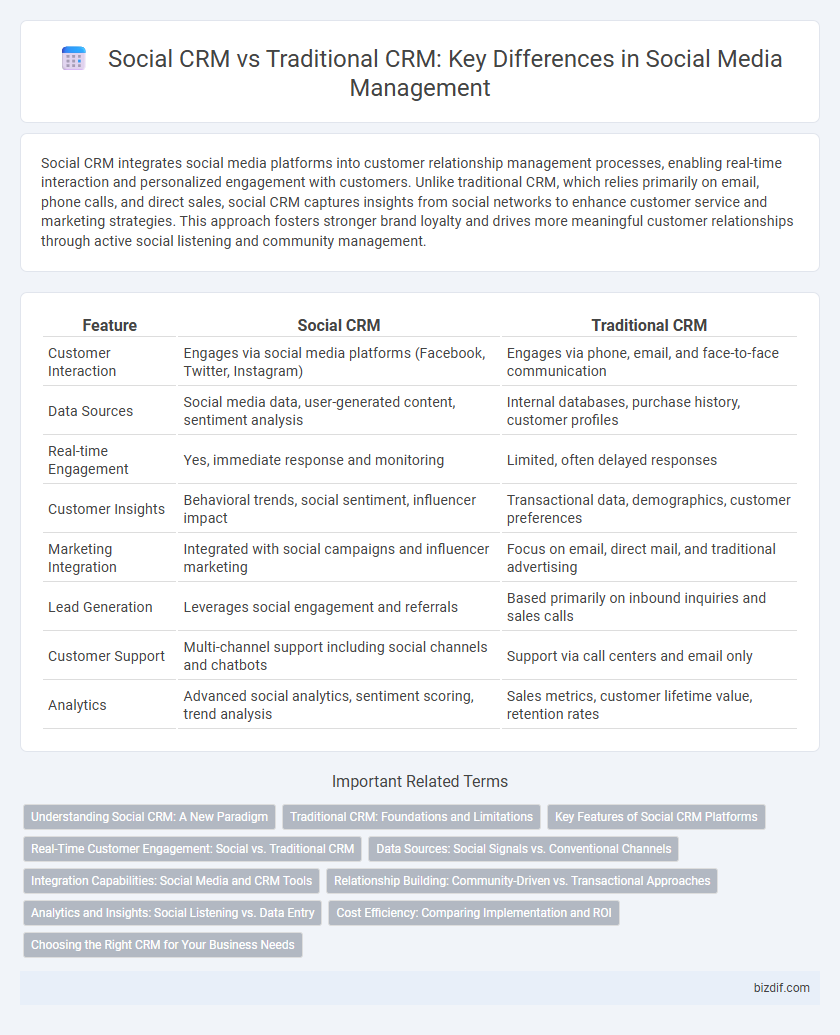Social CRM integrates social media platforms into customer relationship management processes, enabling real-time interaction and personalized engagement with customers. Unlike traditional CRM, which relies primarily on email, phone calls, and direct sales, social CRM captures insights from social networks to enhance customer service and marketing strategies. This approach fosters stronger brand loyalty and drives more meaningful customer relationships through active social listening and community management.
Table of Comparison
| Feature | Social CRM | Traditional CRM |
|---|---|---|
| Customer Interaction | Engages via social media platforms (Facebook, Twitter, Instagram) | Engages via phone, email, and face-to-face communication |
| Data Sources | Social media data, user-generated content, sentiment analysis | Internal databases, purchase history, customer profiles |
| Real-time Engagement | Yes, immediate response and monitoring | Limited, often delayed responses |
| Customer Insights | Behavioral trends, social sentiment, influencer impact | Transactional data, demographics, customer preferences |
| Marketing Integration | Integrated with social campaigns and influencer marketing | Focus on email, direct mail, and traditional advertising |
| Lead Generation | Leverages social engagement and referrals | Based primarily on inbound inquiries and sales calls |
| Customer Support | Multi-channel support including social channels and chatbots | Support via call centers and email only |
| Analytics | Advanced social analytics, sentiment scoring, trend analysis | Sales metrics, customer lifetime value, retention rates |
Understanding Social CRM: A New Paradigm
Social CRM integrates social media channels with traditional customer relationship management systems, enabling real-time interaction and personalized customer engagement. It leverages data from social networks to enhance customer insights, improve service, and foster communities around brands. Unlike traditional CRM, Social CRM emphasizes collaboration and conversation, transforming customers into active participants in the business ecosystem.
Traditional CRM: Foundations and Limitations
Traditional CRM systems primarily focus on managing customer data, sales processes, and service interactions through centralized databases and predefined workflows. These platforms often lack real-time social media integration, limiting their ability to capture dynamic customer sentiments and engage proactively. As a result, traditional CRM faces challenges in delivering personalized experiences and responding swiftly to evolving customer needs in social media-driven markets.
Key Features of Social CRM Platforms
Social CRM platforms integrate social media channels to enhance customer engagement by enabling real-time interaction, sentiment analysis, and community management. These systems offer advanced analytics that track social conversations, providing deeper insights into customer preferences and behaviors compared to traditional CRM. Key features include social listening tools, seamless integration with social networks, and automated workflow management designed to foster personalized communication and improve brand loyalty.
Real-Time Customer Engagement: Social vs. Traditional CRM
Social CRM enables real-time customer engagement by integrating social media interactions directly into customer profiles, allowing immediate responses and personalized experiences. Traditional CRM relies on scheduled updates and delayed communication channels, resulting in slower reaction times and less dynamic customer relationships. This immediacy in social CRM enhances brand loyalty and drives higher customer satisfaction through proactive interaction.
Data Sources: Social Signals vs. Conventional Channels
Social CRM harnesses data from social signals such as user interactions, sentiment analysis, and real-time engagement on platforms like Facebook, Twitter, and Instagram, offering dynamic customer insights. Traditional CRM relies on conventional channels including email, phone calls, and transactional records, providing structured but often static customer data. Integrating social signals with traditional data sources enhances customer profiles and drives more personalized marketing strategies.
Integration Capabilities: Social Media and CRM Tools
Social CRM integrates social media channels directly with traditional CRM tools, enabling real-time customer interaction and data collection from platforms like Facebook, Twitter, and Instagram. This seamless integration allows businesses to track social engagement, sentiment, and customer preferences within a unified CRM system, enhancing personalized marketing and support strategies. Traditional CRM lacks these native social media capabilities, limiting insights and responsiveness in today's digitally connected environment.
Relationship Building: Community-Driven vs. Transactional Approaches
Social CRM emphasizes relationship building through community-driven interactions, fostering genuine engagement and long-term loyalty by leveraging social media platforms for real-time communication and feedback. Traditional CRM primarily focuses on transactional data collection and sales processes, often lacking the dynamic interaction that strengthens customer relationships. By integrating social insights, Social CRM enables brands to create personalized experiences that enhance customer satisfaction and advocacy.
Analytics and Insights: Social Listening vs. Data Entry
Social CRM leverages advanced social listening tools to capture real-time customer sentiment and engagement across platforms, providing dynamic analytics and actionable insights that traditional CRM's manual data entry lacks. This enables businesses to identify trends, track brand reputation, and respond promptly to customer feedback, enhancing personalized marketing strategies. Traditional CRM relies heavily on static data input, limiting its ability to offer real-time customer behavior analysis and proactive decision-making.
Cost Efficiency: Comparing Implementation and ROI
Social CRM offers cost efficiency by integrating social media channels directly into customer relationship management, reducing the need for multiple standalone systems and lowering implementation expenses. Traditional CRM often involves higher upfront costs with extensive customization and licenses, whereas Social CRM leverages real-time data and automation to boost ROI through improved customer engagement and faster response times. Businesses using Social CRM typically experience enhanced cost savings over time due to streamlined workflows and increased customer retention driven by social interaction insights.
Choosing the Right CRM for Your Business Needs
Social CRM integrates social media interactions directly into customer relationship management, enhancing real-time engagement and personalized experiences compared to traditional CRM's focus on sales and contact data management. Businesses prioritizing customer engagement on social platforms, social listening, and reputation management benefit from Social CRM's seamless integration with social networks like Facebook, Twitter, and Instagram. For companies with strong outbound sales processes and internal operational needs, traditional CRM solutions such as Salesforce or Microsoft Dynamics offer robust pipeline tracking and automation features.
social CRM vs traditional CRM Infographic

 bizdif.com
bizdif.com